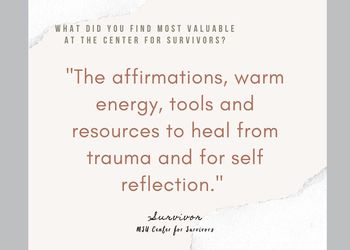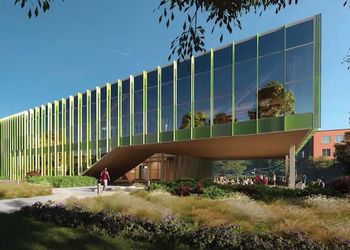A Commitment to Supporting Survivors
Content warning: This story contains content that may be triggering to members of our community. Note: Survivor identities will remain anonymous throughout this article. Their testimonials will be shared under the pseudonym “Survivor.”

MSU’s Center for Survivors and Sexual Assault Healthcare Program are recognized as national models for responding to sexual violence. Tana Fedewa, the center’s executive director, is developing this program to be a comprehensive resource for survivors to receive healing and begin taking steps to seek justice.
Fedewa was no stranger to this work when she took the lead of this team more than eight years ago. She joined the program after receiving her Master of Social Work from MSU and later completing internships in domestic violence and sexual assault programs.
“When I began leading this unit in 2015, there were four full-time staff,” says Fedewa. “We have continued to add passionate, creative and highly skilled therapists and advocates to our team.”
The center now employs 28 full-time staff members as well as 100 crisis intervention volunteers, providing a range of free therapy, advocacy and crisis services to anyone who has experienced sexual violence in their lifetime. It serves faculty, staff, students and community members, though therapy services are only available to MSU students.
Fedewa says one of her hopes is to continue expanding and adapting to meet the needs of survivors across the campus community.
“I cannot even begin to describe it; it’s changed my life,” says Survivor 1. “I could barely get out of bed after my assault, and now my therapist has helped me want to live again and live fully.”
The center currently is funded through a federal Victims of Crime Act, or VOCA, grant administered by the state of Michigan as well as through donations and some university funding. Since 2015, this grant funding has increased from less than $300,000 per year to more than $1.7 million per year as the program has grown to meet the demand for addi?tional therapy and advocacy services.
This funding has also been used to create a campus Sexual Assault Response Team and the Sexual Assault Healthcare Program. In addition, the Center for Survivors utilized these funds to create a trauma-informed space on campus where survivors can have their healing and justice needs met in a single location instead of having to navigate multiple offices.
“I have an advocate who is supporting me through a current court case,” says Survivor 2. “From understanding what is being said to processing through my feelings to attending court with me, she is my first-touch person I reach out to whenever I have any questions or concerns.”
“The center’s services are unique in our ability to provide wraparound, holistic care,” says Kathleen Miller, associate director of the Center for Survivors. The Center for Survivors provided nearly 4,500 therapy sessions and al?most 2,700 advocacy services in 2022.



